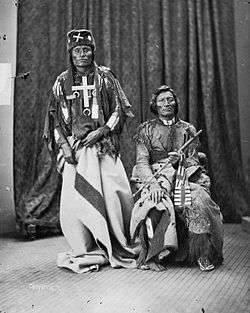Morning Star (chief)
| Morning Star | |
|---|---|
| Vóóhéhéve, Motšêške Ôhnêxahpo, Tamílapéšni, Tah-me-la-pash-me | |
 | |
| Personal details | |
| Born | 1810 |
| Died | 1883 |
| Resting place | Lame Deer, Montana |
Morning Star (Cheyenne: Vóóhéhéve,[1] also known by his Lakota Sioux name Tamílapéšni, Dull Knife[2][3]) was a great chief of the Northern Cheyenne people and headchief of the Notameohmésêhese ("Northern Eaters", also simply known as Ȯhmésėhese - "Eaters") band during the 19th century. He was noted for his active resistance to Western expansion and the Federal government. It is due to the courage and determination of Morning Star and other Cheyenne leaders that the Northern Cheyenne still possess a homeland in their traditional country (present-day Montana).
Although he was known as "Dull Knife" (or Motšêške Ôhnêxahpo in Cheyenne, a translation of his Lakota name) to local settlers, U.S. military leaders, and other American Indians, his Cheyenne name is Morning Star. A Cheyenne warrior in every sense of the word, Morning Star was described by many writers of the century as "an admirable outlaw" compared to others like Rob Roy and William Wallace.

In 1868, Morning Star represented his tribe at the signing of the Treaty of Fort Laramie. Following "Custer's Last Stand" at the Battle of Little Bighorn in 1876, Morning Star allied with the Sioux and other tribes against the United States. However, after a disastrous raid (the Dull Knife Fight) by American soldiers in which 200 lodges were destroyed and 700 "head of stock" captured, most of the Cheyenne were eventually forced to surrender.[4] They were transported to the Indian Territory in Oklahoma.
Unable to hunt, the tribe began to suffer from starvation and disease until September 1878, when Morning Star began to lead the tribe north back toward their ancient homelands. Fighting through, the Cheyenne were able to outmaneuver Federal troops in the Nebraska Sand Hills until they were captured near Fort Robinson in Nebraska. The tribe was said to have taken apart their guns, hidden under blankets or worn as necklaces and bracelets by children. On January 8, 1879, the tribe again tried to escape north when most of the Cheyenne, mostly women and children, were killed by Federal troops. However a few of the tribe managed to escape, including Dull Knife.
Morning Star died in 1883 and is interred on the Northern Cheyenne reservation at Lame Deer Cemetery. Chief Dull Knife College, which is also in Lame Deer, is named in his honor.
His photograph, as Dull Knife, appears in Dee Brown's 1971 bestseller Bury My Heart at Wounded Knee.
On May 7, 1957, the actor Ian McDonald played Dull Knife in the episode "Dull Knife Strikes for Freedom" on the ABC/Desilu western television series, The Life and Legend of Wyatt Earp, with Hugh O'Brian in the title role as deputy marshal Wyatt Earp. In the story line Dull Knife leads his Indians from their reservation in Oklahoma Territory to their homeland in Montana, to which they claim the U.S. government had promised them. Meanwhile, some of their braves attack and burn a white settlement.[5]
References
- ↑ "Cheyenne Dictionary" (September 5, 2007 version). Chief Dull Knife College. Retrieved September 19, 2007.
- ↑ Recorded as Tah-me-la-pash-me; from ta (his) + míla (big knife) + péšni (dull)
- ↑ Buechel, Eugene; Paul Manhart (2002) [1970]. Lakota Dictionary: Lakota-English/English-Lakota (New Comprehensive ed.). Lincoln and London: University of Nebraska Press. ISBN 0-8032-1305-0. OCLC 49312425.
- ↑ Bourke, John (1966). Mackenzie's Last Fight with the Cheyennes. Argonaut Press Ltd. pp. 36, 39, 55.
- ↑ ""Dull Knife Strikes for Freedom", The Life and Legend of Wyatt Earp, May 7, 1957". Internet Movie Data Base. Retrieved April 16, 2014.
- Grant, Bruce, The Concise Encyclopedia of the American Indian, 3rd ed., Wings Books: New York, 2000.
External links
- Encyclopedia of Oklahoma History and Culture - Dull Knife
- Dull Knife, Native Northern Cheyenne Chief at Find a Grave
Further reading
- Berthrong, Donald J., The Cheyenne and Arapaho Ordeal (Norman: University of Oklahoma Press, 1976).
- Blackmar, Frank (1912). Kansas: A Cyclopedia of State History, Embracing Events, Institutions, Industries, Counties, Cities, Towns, Prominent Persons, Etc, Volume 2. Standard Pub. Co.
- Bronson, Edgar Beecher (February 1909). "A Finish Fight for a Birthright: Little Wolf's Escape and Dull Knife's Capture". Pearson's. 21 (2): 205–213. Retrieved 9 May 2016. Illustrated by Maynard Dixon.
- Brown, Dee (2003). Bury My Heart at Wounded Knee: An Indian History of the American West. Macmillan. ISBN 0-8050-6669-1.
- Dockstader, Frederick (1977). Great North American Indians: profiles in life and leadership. Van Nostrand Reinhold. ISBN 0-442-02148-8.
- Eastman, Charles (2004). Indian Heroes and Great Chieftains. 1st World Publishing. ISBN 1-59540-059-1.
- Grinnell, George (2004). The Fighting Cheyennes. Digital Scanning Inc. ISBN 1-58218-390-2.
- Hoig, Stan (2002). Perilous pursuit : the U.S. Cavalry and the northern Cheyennes. Boulder, CO: University Press of Colorado. Retrieved 2013-03-24.
- John Stands in Timber, Cheyenne Memories (New Haven: Yale University Press, 1967).
- Marshall, Joseph M., III (2005). The Journey of Crazy Horse: A Lakota History. Penguin Group. ISBN 0-14-303621-1.
- Monnett, John (2004). Tell Them We Are Going Home: The Odyssey of the Northern Cheyennes. University of Oklahoma Press. ISBN 0-8061-3645-6.
- Sandoz, Mari (2005). Cheyenne autumn. U of Nebraska Press. ISBN 0-8032-9341-0.
- Seton, Ernest Thompson (1921). The Book of Woodcraft. Garden City, New York: Garden City Publishing Co. pp. 548–571. Retrieved 9 May 2016.
- Starita, Joe (2002). The Dull Knifes of Pine Ridge. Bison Books. ISBN 0-8032-9294-5.
- Starita, Joe (2009). "I Am a Man": Chief Standing Bear's Journey for Justice. Macmillan. ISBN 0-312-53304-7.